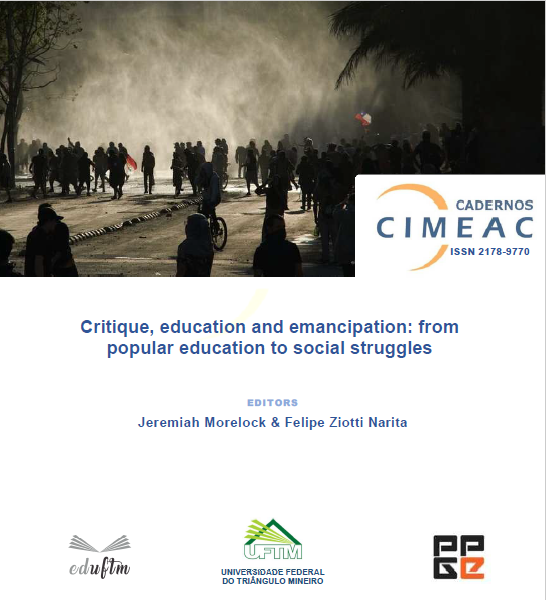Decolonial movements in rural teacher's training: resistance to the segregated knowledge pattern
DOI:
https://doi.org/10.18554/cimeac.v12i3.6634Abstract
The year of 2020 is the milestone of a decade since the implementation of the Rural Education Policy, also known as Procampo, which was enacted through Decree n. 7.352, from November 4, 2010. This policy, as victory of social movements, is changing university spacetimes, territorialities and the daily lives of rural communities. Therefore, it summarizes the counter-hegemonic struggle for different educational rights, for the emancipation of teaching practices and for schools and communities’ autonomy. Based on such elements, the aim of the present article is to present autobiographical narratives according to which students and teachers rescue different decolonial movements observed in academic training as the very outcome of experiences built on Interdisciplinary Degree in Rural Education at Fluminense Federal University (UFF). The narratives highlight that Rural Education breaks up with the Eurocentric view of knowledge in order to acknowledge the richness of different knowledge fields, identities, and students’ historical and epistemic place with a colonial scene that denies differences to the detriment of submission practices. In order to face such reality, the narratives point out that the Rural Education proposes decolonial movements – as prevailing feature in teachers’ training – focused on coping with, as well as on resisting and repairing historical violence imposed by the coloniality.
Downloads
Published
Issue
Section
License
Os autores que publicam nesta revista concordam com os seguintes termos:
(a) Não cobramos dos autores para a publicação neste periódico.
(b) Autores mantém os direitos autorais e concedem à revista o direito de primeira publicação, com o trabalho simultaneamente licenciado sob a Licença Creative Commons que permite o compartilhamento do trabalho com reconhecimento da autoria e publicação inicial nesta revista.
(c) Autores têm permissão e são estimulados a difundir e a distribuir a versão publicada de seu trabalho online (ex.: em repositórios institucionais ou na sua página pessoal) após o processo editorial, já que isso pode aumentar o impacto e a citação do trabalho publicado (Veja O Efeito do Acesso Livre).
* * *
AUTHORS COPYRIGHT AND PUBLISHING RIGHTS
Authors who publish with this journal agree to the following terms:
(a) This journal does not charge authors for publication.
(b) Authors retain copyright and grant the journal right of first publication with the work simultaneously licensed under a Creative Commons Attribution License that allows others to share the work with an acknowledgement of the work's authorship and initial publication in this journal.
(c) For authors whose articles have been accepted: authors are permitted and encouraged to post their work online (e.g., in institutional repositories or on their website) after the publication of the text in Cadernos CIMEAC, as it can lead to productive exchanges as well as earlier and greater citation of published work (See The Effect of Open Access).

 10.18554/cimeac
10.18554/cimeac

